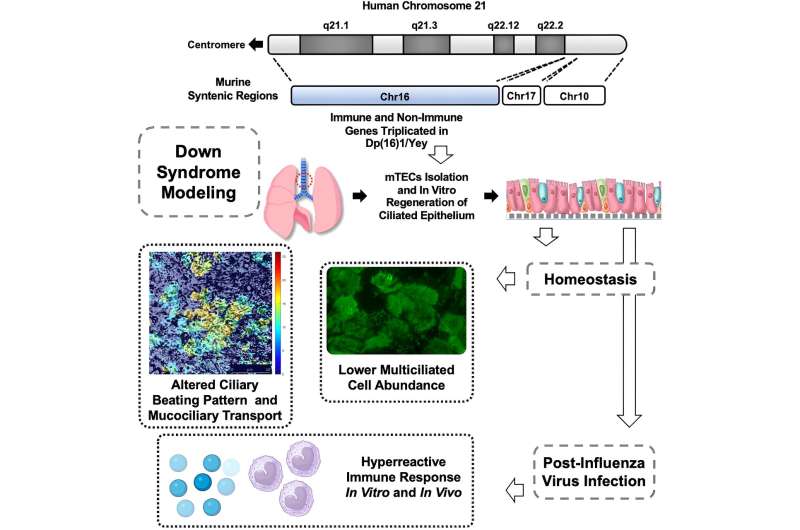Scientists discover mechanisms that could explain high risk of complications from lung infections in Down syndrome

Individuals with Down syndrome, the genetic condition caused by triplication of human chromosome 21, also known as trisomy 21, display a very high risk of hospitalization and mortality after developing lung infections. Respiratory disease is second only to congenital heart defects as a cause of death among children with Down syndrome, and lower respiratory tract pathology is the most common cause of acute hospital admissions in this population. Furthermore, adults with Down syndrome have a much higher risk of hospitalization and death from COVID-19. Despite many research efforts, the mechanisms by which trisomy 21 causes these effects have been unclear.
In a recent study published in iScience, a multidisciplinary team of scientists at the University of Pittsburgh, the Linda Crnic Institute for Down Syndrome at the University of Colorado, and the Icahn School of Medicine at Mount Sinai in New York report a series of studies illuminating two major mechanisms underlying high risks from lung infections in Down syndrome: poor ciliary function and immune hyper-reactivity.
The research team, led by Kambez H. Benam Ph.D., completed a series of experiments using a sophisticated cell culture system mimicking the conditions of the airway lining as well as a mouse model of Down syndrome. The first key observation from the cell culture experimental paradigm was that the trisomy impairs the number and function of the cellular appendages known as cilia in key airway lining cells. Cilia, which are motile cellular protrusions with key functions in the movement of fluids and clearance of debris outside the cell, were found in fewer numbers and to beat with less frequency in cells with triplicated genes.
“This defect in ciliary function could decrease the capacity of the respiratory tract to clear mucus and viral particles, thus likely to affect the biodynamics of the upper airway during a viral infection, potentially leading to dangerous accumulation of fluids in the lung,” explains Dr. Benam.
The second key observation from these experiments is that when exposed to a common influenza virus strain, cells with triplicated genes over-produced many inflammatory molecules, including factors involved in the recruitment of immune cells into the lung. Although cells with triplicated genes produced the same number of viral particles, their immune reaction was clearly exacerbated.
“This immune overreaction could be very dangerous during a lung viral infection, leading to massive immune infiltrates that cause more harm than good, eventually compromising lung function,” describes Kelly Sullivan, Ph.D. from the Linda Crnic Institute for Down Syndrome and co-author of the study.
The new results illuminate potential strategies to counteract the harmful effects of trisomy 21 during a lung infection. “These results contribute to a growing body of evidence indicating that immune hyper-reactivity can cause many health issues in Down syndrome and justifies the testing of therapies that could restore immune balance in this population,” says Joaquin Espinosa, Ph.D., Executive Director of the Linda Crnic Institute for Down Syndrome and co-author of the study.
“We are currently performing clinical trials testing a class of immune-modulatory medicines known as JAK inhibitors for multiple therapeutic endpoints in Down syndrome, and the new results from this study indicate that these medicines could improve lung health, even during a viral infection, as it has been demonstrated in the general population when JAK inhibitors were approved for severe COVID-19 cases during the pandemic,” Espinosa adds.
The research team has identified many important future directions, including the analysis of other lung pathogens as well as the testing of diverse immune-modulatory agents in the mouse model and in advanced cell-based models of Down syndrome.
“We look forward to making additional important contributions to the understanding of lung health and disease in Down syndrome, with clear potential to benefit this population across the lifespan,” says Dr. Benam.
More information:
Samantha N. Thomas et al, Down syndrome is associated with altered frequency and functioning of tracheal multiciliated cells, and response to influenza virus infection, iScience (2023). DOI: 10.1016/j.isci.2023.107361
Journal information:
iScience
Source: Read Full Article
